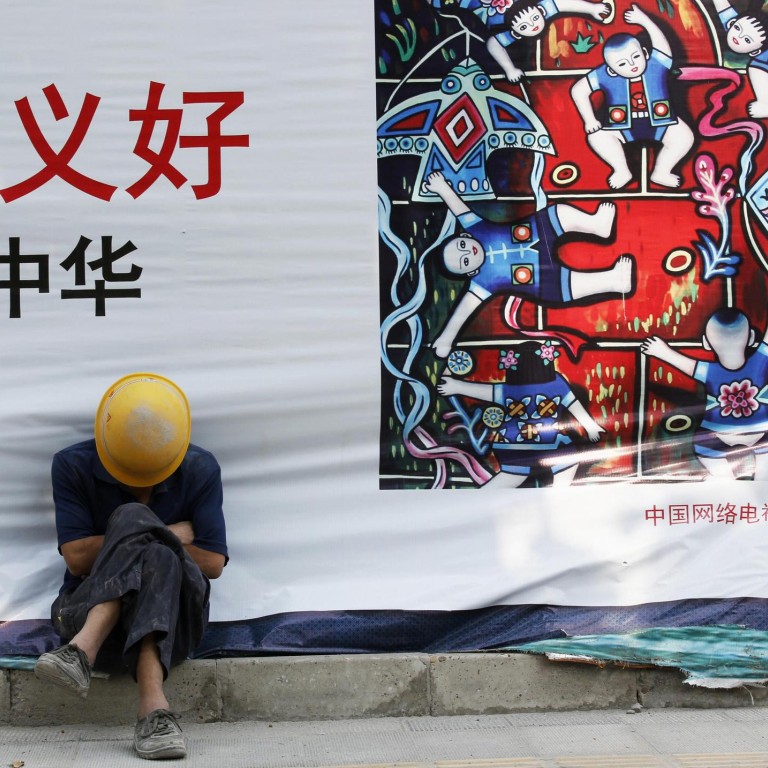
Shadow banking raises risk fears
Non-bank credit such as 'entrusted loans' has continued to increase, defying a crackdown by Beijing and threatening the economy's growth
Property developer Zhang Fuguo's application for a loan to help keep building two office towers in Zhengzhou was rejected by banks. So he turned to a manufacturer of water and gas meters.

But it was less so for one board member at lender Henan Suntront Technology, who abstained from approval on concerns that Zhang's company would fail to repay the debt.
So-called entrusted loans, in which banks are "entrusted" with funds as middlemen between companies, increasingly grease the wheels of the mainland economy, withstanding a crackdown on shadow banking this year and rising to a record 293.8 billion yuan last month.
The increase was part of a surge in non-bank credit that may add to default risks threatening Premier Li Keqiang's efforts to sustain 7 per cent expansion this decade.
"The more that we have financial activity taking place in the shadow-banking system, under the current regulatory standards and regime, the more risky it is," said Louis Kuijs, the chief China economist at Royal Bank of Scotland in Hong Kong.
Entrusted loans and other financing outside the main banking system were "not so well regulated", and "people who hold the assets don't always understand and don't always know where the money is actually being used", Kuijs said.
The increase in aggregate financing followed an unprecedented four consecutive month-on-month declines and the government's signal that it would defend the year's 7.5 per cent expansion goal after two quarterly slowdowns.
Li, who is preparing for a Communist Party meeting in November on economic reforms, said earlier this month the nation was taking steps to stabilise expansion and could achieve its main economic targets this year.
Shadow lending, which allows banks to bypass controls and capital requirements, may be valued at as much as 36 trillion yuan, or 69 per cent of gross domestic product, JP Morgan Chase estimated in May.
Entrusted loans were equivalent in August to 41 per cent of the month's 711.3 billion yuan in new local-currency bank loans - the second-highest percentage in the past five years.
Both types of lending are part of aggregate financing, the government's broadest measure of credit, which almost doubled to 1.57 trillion yuan from July, People's Bank of China data showed.
A report from the statistics bureau last week showed new home prices in four major cities rose last month by the most since January 2011, on expectations that the government will not implement new nationwide property curbs soon.
Regulators, in an effort to clamp down on speculative lending after a record credit boom in the first quarter, allowed a cash crunch in June that sent money-market interest rates to record highs. It had little effect on entrusted loans, which accounted for about 24 per cent of total credit in July, the highest proportion since 2007, before dipping to 19 per cent last month.
"In the short term, it is positive for growth," said Dong Tao, the head of economics for Asia excluding Japan at Credit Suisse in Hong Kong. "However, compared with bank loans, it has less transparency and bigger risks. It is a blind spot of regulation."
Tao said the pickup in credit last month showed that "quietly, shadow banking channels opened again" as the government softened its regulatory stance.
The government says debt risks are manageable. Vice-Finance Minister Zhu Guangyao said earlier this month at a Group of 20 nations summit in Russia that while China should strengthen supervision of shadow banking, officials were aware that smaller businesses needed access to finance.
Kuijs said the increase in credit would probably prove temporary because key people such as the premier "are telling us that they do not want to go in that direction".
Lenders include Ningbo Yunsheng, a magnet maker, and Shanghai Tunnel Engineering, a local government's infrastructure-construction arm. At least 110 publicly traded companies announced plans to lend about 20 billion yuan to other firms in the first half, charging annual interest rates ranging from 7 to 12 per cent, according to Shanghai Wusetu Mortgage Service.
Zhu Haibin, the chief China economist at JP Morgan in Hong Kong, said entrusted loans reflected demand from companies to support operations, and one month's increase "may not be a big problem".
The complex being built by Zhang, the developer in Zhengzhou, is called Yuxi. Suntront, the meter maker now financing the construction, said in a July 31 filing with the Shenzhen Stock Exchange that the one-year loan to Zhang's company, Henan Fuguo Property, would improve the manufacturer's returns and would not harm corporate or shareholder interests.
"The entrusted loan has sufficient guarantees from buildings under construction as collateral," Suntront said.
Li Shuqu, the Suntront director who abstained from approving the loan, cited Henan Fuguo's liability-asset ratio of about 65 per cent, net assets of 78.4 million yuan, losses and lack of revenue, according to Suntront.
Zhang said banks had turned down his loan application because of restrictions on lending to property developers.
"Money will flow in once sales officially start," he said. "With the loan, I am fully confident about the financial prospects."

